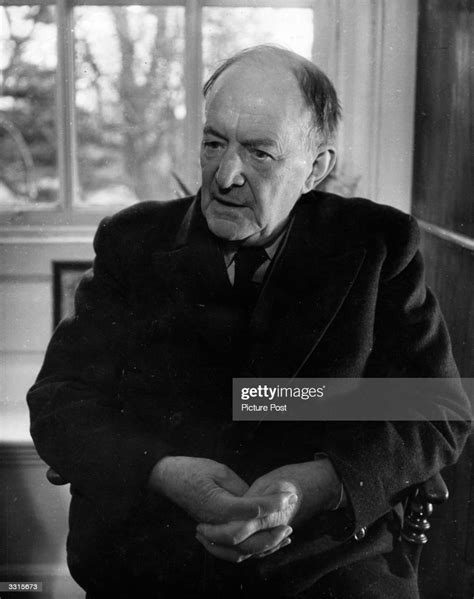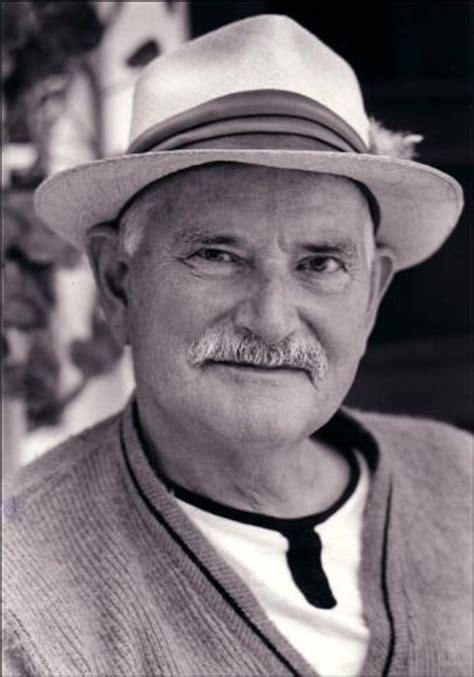Top 865 Solitary Confinement Quotes & Sayings - Page 15
Explore popular Solitary Confinement quotes.
Last updated on November 15, 2024.
I felt a funeral in my brain, and mourners to and fro kept treading, treading till I felt that sense was breaking through. And when they all were seated, a service, like a drum, kept beating, beating, till I felt my mind was going numb. And then I heard them lift a box and creak across my soul with those same boots of lead again, then space began to toll, as if the heavens were a bell and being were an ear, and I, and silence, some strange race wrecked, solitary, here. Just then, a plank in reason broke, and I fell down and down and hit a world at every plunge, and finished knowing then.
"The Universe repeats itself, with the possible exception of history." Of all earthly studies history is the only one that does not repeat itself. ... Astronomy repeats itself; botany repeats itself; trigonometry repeats itself; mechanics repeats itself; compound long division repeats itself. Every sum if worked out in the same way at any time will bring out the same answer. ... A great many moderns say that history is a science; if so it occupies a solitary and splendid elevation among the sciences; it is the only science the conclusions of which are always wrong.
His brow is seamed with line and scar; His cheek is red and dark as wine; The fires as of a Northern star Beneath his cap of sable shine. His right hand, bared of leathern glove, Hangs open like an iron gin, You stoop to see his pulses move, To hear the blood sweep out and in. He looks some king, so solitary In earnest thought he seems to stand, As if across a lonely sea He gazed impatient of the land. Out of the noisy centuries The foolish and the fearful fade; Yet burn unquenched these warrior eyes, Time hath not dimmed, nor death dismayed.
In a sermon entitled “God's Providence,” C. H. Spurgeon said, “Napoleon once heard it said, that man proposes and God disposes. 'Ah,' said Napoleon, 'but I propose and dispose too.' How do you think he proposed and disposed? He proposed to go and take Russia; he proposed to make all Europe his. He proposed to destroy that power, and how did he come back again? How had he disposed it? He came back solitary and alone, his mighty army perished and wasted, having well-nigh eaten and devoured one another through hunger. Man proposes and God disposes.
There was just one moon. That familiar, yellow, solitary moon. The same moon that silently floated over fields of pampas grass, the moon that rose--a gleaming, round saucer--over the calm surface of lakes, that tranquilly beamed down on the rooftops of fast-asleep houses. The same moon that brought the high tide to shore, that softly shone on the fur of animals and enveloped and protected travelers at night. The moon that, as a crescent, shaved slivers from the soul--or, as a new moon, silently bathed the earth in its own loneliness. THAT moon.
An observer will see the bizarre developments of behavior only in alien cultures, not his own. Nevertheless this is obviously a local and temporary bias. There is no reason to suppose that any one culture has seized upon an eternal sanity and will stand in history as a solitary solution of the human problem. Even the next generation knows better. Our only scientific course is to consider our own culture, so far as we are able, as one example among innumerable others of the variant configurations of human culture.
The work saved me. I clung to it like flotsam in a boiling sea. It was the only solitary sport that I ever played, or was any good at. It felt natural to sit at my computer and type and type some more. For entire minutes, while writing, I could forget the godawful thing that had happened. I could forget that nothing really mattered anymore. Perhaps, if I set my sights low, I could care again about some small thing. I would type a word. One word. Then another. I started to care about the words, then entire sentences.
You don't believe that your friend could ever do anything great. You despise yourself in secret, even – no, especially – when you stand on your dignity; and since you despise yourself, you are unable to respect your friend. You can't bring yourself to believe that anyone you have sat at table with, or shared a house with, is capable of great achievement. That is why all great men have been solitary. It is hard to think in your company, little man. One can only think 'about' you, or 'for your benefit', not 'with' you, for you stifle all big, generous ideas.
Why should I blame her that she filled my days With misery, or that she would of late Have taught to ignorant men most violent ways, Or hurled the little streets upon the great, Had they but courage equal to desire? What could have made her peaceful with a mind That nobleness made simple as a fire, With beauty like a tightened bow, a kind That is not natural in an age like this Being high and solitary and most stern? Why, what could she have done, being what she is? Was there another Troy for her to burn?
Every man that tried to destroy the Government, every man that shot at the holy flag in heaven, every man that starved our soldiers... every man that wanted to burn the negro, every one that wanted to scatter yellow fever in the North, every man that opposed human liberty, that regarded the auction-block as an altar and the howling of the bloodhound as the music of the Union, every man who wept over the corpse of slavery, that thought lashes on the naked back were a legal tender for labour performed, every one willing to rob a mother of her child - every solitary one was a Democrat.
The point I wish plainly to bring before you on this occasion is the individuality of each human soul--our Protestant idea, the right of individual conscience and judgment--our republican idea, individual citizenship. In discussing the rights of woman, we are to consider, first, what belongs to her as an individual, in a world of her own, the arbiter of her own destiny, an imaginary Robinson Crusoe with her woman Friday on a solitary island. Her rights under such circumstances are to use all her faculties for her own safety and happiness.
Hold your hands out over the earth as over a flame. To all who love her, who open to her the doors of their veins, she gives of her strength, sustaining them with her own measureless tremor of dark life. Touch the earth, love the earth, honor the earth, her plains, her valleys, her hills, and her seas; rest your spirit in her solitary places. For the gifts of life are the earth's and they are given to all, and they are the songs of birds at daybreak, Orion and the Bear, and dawn seen over ocean from the beach.
Brothers and sisters, one of the great consolations of this Easter season is that because Jesus walked such a long, lonely path utterly alone, we do not have to do so. His solitary journey brought great company for our little version of that path…This Easter week and always, may we stand by Jesus Christ ‘at all times and in all things, and in all places that (we) may be in, even until death,’ for surely that is how He stood by us when it was unto death and when He had to stand entirely and utterly alone.
Peter, in showing that the Church is one and that only those who are in the Church can be saved, said: "In the Ark of Noah certain persons, numbering only eight, were saved by water, which Baptism effects in like manner for you" (1 Peter 3:20). He proves and demonstrates that the solitary Ark of Noah was the figure of the One Church. If, at the time of this Baptism of the world anyone could have been saved without having been in the Ark of Noah, then he who is outside the Church could now be brought to life by Baptism.
...solitary like a pool at evening, far distant, seen from a train window, vanishing so quickly that the pool, pale in the evening, is scarcely robbed of its solitude, though once seen. *** Here sitting on the world, she thought, for she could not shake herself free from the sense that everything this morning was happening for the first time, perhaps for the last time, as a traveller, even though he is half asleep, knows, looking out of the train window, that he must look now, for he will never see that town, or that mule-cart, or that woman at work in the fields, again.
When we haven't the time to listen to each other's stories we seek out experts to tell us how to live. The less time we spend together at the kitchen table, the more how-to books appear in the stores and on our bookshelves. But reading such books is a very different thing than listening to someone' s lived experience. Because we have stopped listening to each other we may even have forgotten how to listen, stopped learning how to recognize meaning and fill ourselves from the ordinary events of our lives. We have become solitary; readers and watchers rather than sharers and participants.
A learned man is a sedentary, concentrated solitary enthusiast, who searches through books to discover some particular grain of truth upon which he has set his heart. If the passion for reading conquers him, his gains dwindle and vanish between his fingers. A reader, on the other hand, must check the desire for learning at the outset; if knowledge sticks to him well and good, but to go in pursuit of it, to read on a system, to become a specialist or an authority, is very apt to kill what suits us to consider the more humane passion for pure and disinterested reading.
They had stopped now and he gave a glance up at the sky, through the trees, as though to see how much time was left. Amber, watching him, was suddenly struck with panic. Now he was going--out again into that great world with its bustle and noise and excitement--and she must stay here. She had a terrible new feeling of loneliness, as if she stood in some solitary corner at a party where she was the only stranger. Those places he had seen, she would never see; those fine things he had done, she would never do. But worst of all she would never see him again.
The appearance presented by the streets of London an hour before sunrise, on a summer's morning, is most striking even to the few whose unfortunate pursuits of pleasure, or scarcely less unfortunate pursuits of business, cause them to be well acquainted with the scene. There is an air of cold, solitary desolation about the noiseless streets which we are accustomed to see thronged at other times by a busy, eager crowd, and over the quiet, closely-shut buildings, which throughout the day are swarming with life and bustle, that is very impressive.
Meetings are held because men seek companionship or, at a minimum, wish to escape the tedium of solitary duties. They yearn for the prestige which accrues to the man who presides over meetings, and this leads them to convoke assemblages over which they can preside. Finally, there is the meeting which is called not because there is business to be done, but because it is necessary to create the impression that business is being done. Such meetings are more than a substitute for action. They are widely regarded as action.
Songs and smells will bring you back to a moment in time more than anything else. It's amazing how much can be conjured with a few notes of a song or a solitary whiff of a room. A song you didn't even pay attention to at the time, a place that you didn't even know had a particular smell. I wonder what will someday bring back Dex and our few months together. Maybe the sound of Dido's voice. Maybe the scent of the Aveda shampoo I've been using all summer.
I think the act of reading imbues the reader with a sensitivity toward the outside world that people who don't read can sometimes lack. I know it seems like a contradiction in terms; after all reading is such a solitary, internalizing act that it appears to represent a disengagement from day-to-day life. But reading, and particularly the reading of fiction, encourages us to view the world in new and challenging ways...It allows us to inhabit the consciousness of another which is a precursor to empathy, and empathy is, for me, one of the marks of a decent human being.
There was something formless and perfect before the universe was born. It is serene. Empty. Solitary. Unchanging. Infinite. Eternally present. It is the mother of the universe. For lack of a better name, I call it the Tao. It flows through all things, inside and outside, and returns to the origin of all things. The Tao is great. The universe is great. Earth is great. Man is great. These are the four great powers. Man follows the earth. Earth follows the universe. The universe follows the Tao. The Tao follows only itself.
The observations and encounters of a solitary, taciturn man are vaguer and at the same times more intense than those of a sociable man; his thoughts are deeper, odder and never without a touch of sadness. Images and perceptions that could be dismissed with a glance, a laugh, an exchange of opinions, occupy him unduly, become more intense in the silence, become significant, become an experience, an adventure, an emotion. Solitude produces originality, bold and astonishing beauty, poetry. But solitude also produces perverseness, the disproportionate, the absurd and the forbidden.
If you're a poet, you do something beautiful. I mean, you're supposed to leave something beautiful after you get off the page and everything. The ones you're talking about don't leave a single, solitary thing beautiful. All that maybe the slightly better ones do is sort of get inside your head and leave something there, but just because they do, just because they know how to leave something, it doesn't have to be a poem for heaven's sake. It may just be some kind of terribly fascinating, syntaxy droppings--excuse the expression. Like Manlius and Esposito and all those poor men.























